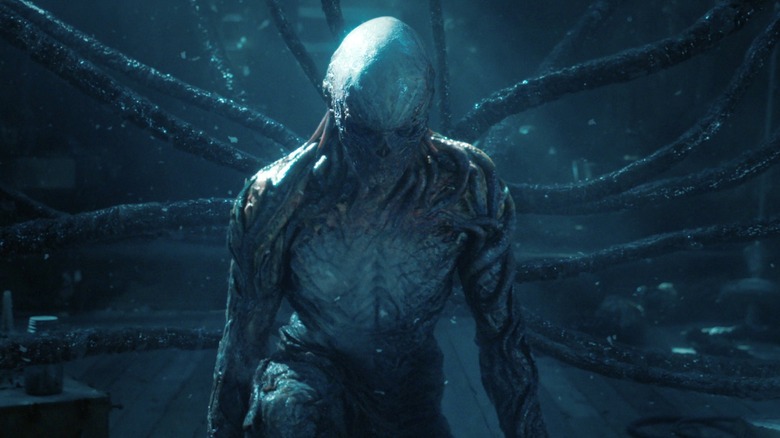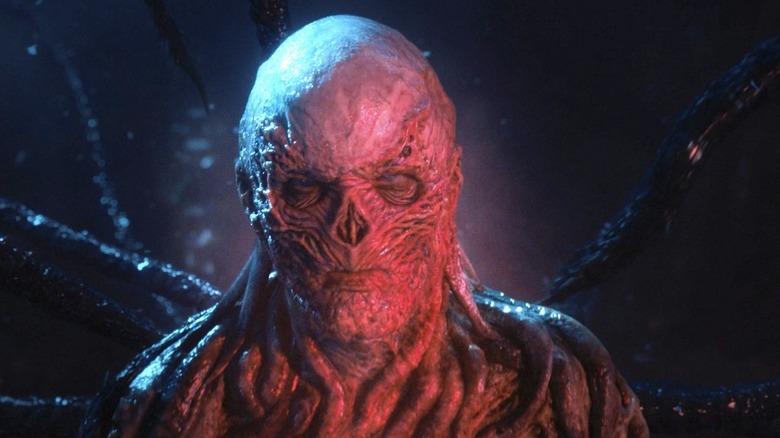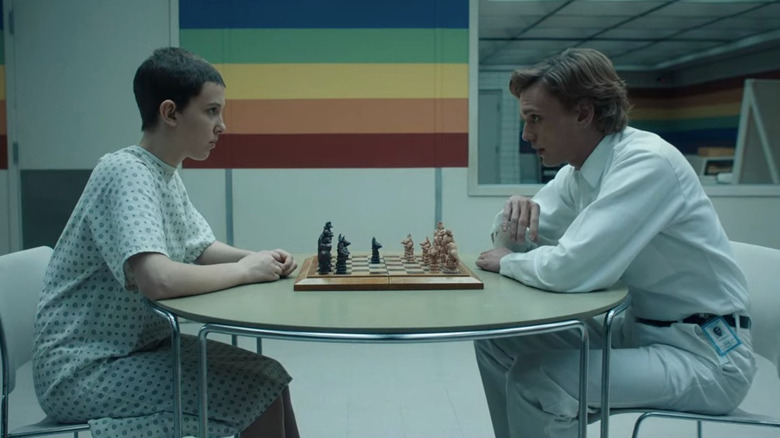A Real Psychologist Profiles Vecna From Stranger Things Season 4
We may receive a commission on purchases made from links.
(Welcome to Pop Culture Psych Profile, where we speak with experts about what drives the greatest heroes and villains in our favorite movies and TV shows. In this edition: Vecna from "Stranger Things" season 4. This article contains major spoilers for episodes 1-7.)
The creature Vecna is murdering people in the town of Hawkins, and terrifying the populace. He's also bringing to light a crime that happened in the town decades prior, making us question what really occurred. To understand what's happening and what might be done about it, we're going to break down the psychology of Vecna, originally named Henry Creel, and using the alias Peter Ballard. I have called upon my colleague Dr. Travis Langley, with whom I have collaborated on the "Stranger Things Psychology: Life Upside Down," to complete this study. Perhaps together, we can find a way to stop Vecna and keep him from killing again.
The Subject: Vecna, formerly known as Henry Creel
Our subject is Henry Creel, also known as Peter Ballard, with the designation 001, or One as Dr. Brenner's test subject. In 1959, after the family moved to Hawkins, Indiana, the young Henry murdered his mother and his sister, though his father Victor Creel was blamed for it. He had previously developed psychic abilities, and was hospitalized by Dr. Martin Brenner, who not only modeled a study around him, but added a number of subjects, also children. After being put under Dr. Brenner's control, Creel was promoted to an advisory position in the study, all the while being controlled by an inhibitor chip in his neck.
Creel formed an attachment to another test subject going by the designation 011, or Eleven, and groomed her to join him in changing the world. He killed the rest of the test subjects and offered her the opportunity to twist reality to their wills. Eleven refused, and fought him, blasting him through a hole in reality to another dimension, designated the "Upside Down." In this mindscape, Creel is known as Vecna, and his appearance has changed to that of an undead monster that resembles a lich of the same name from the roleplaying game Dungeons & Dragons. Vecna has been targeting young people who have guilt over something in their lives, and murdering them to open portals between dimensions. The current death count is at 27 people.
Basic behaviors
An early behavior that may have given his doctors a clue about a diagnosis is Creel's harming of animals. In one case, a rabbit. Dr. Langley states:
"That dead rabbit, if you know much about these things, that right there suggested it was possibly a kid experimenting. Because, you see this, not as much as a lot of people think, but [that's the] so-called Macdonald triad [the idea that three things can signal sociopathy; cruelty to animals, arson, and bedwetting]. Here are these three things to look for in the histories of serial killers and arsonists. And there is more than an average, but not the way people think. It's not as common as we thought. But still, the harm to animals. The child who is harming animals early on is more likely to be somebody that's going to follow the psychopathic path."
Creel did, however, connect with one type of animal. He felt a kinship with the black widow spiders that he found in the vents of the Creel family home. Though Dr. Langley doesn't believe that the act of keeping a spider as a pet is an indication of psychopathy, he says:
"In some non-humans something that resonates with themselves. Firstly, that distance from humanity. Even though it's a spider, it's just a little spider. But that spider, that one little spider, has the power to kill people. That spider is more powerful than these other than these human beings in a lot of different ways. It is not human. It is, it is very practical. It'll kill humans, eat its babies, whatever as necessary for the situation ... That cold, that distance, that horror monster bug-like quality — it's like the Upside Down seems like it is half-spider."
When I pointed out that the Mind Flayer, another creature dwelling in the other dimension, is very spider-like, Dr. Langley responded with:
"The Mind Flayer is very spidery and that could come up again when we find out ... so is he really connected with the Mind Flayer? ... Then we actually haven't seen that from him, but that could have. In fact, that might be what determined the shape of the Mind Flayer for all we know ... Mind Flayer didn't have to take that shape ... The Mind Flayer could have taken a different shape."
Preying on the innocent
Dr. Langley and I spoke about Creel's targeting of children in Dr. Brenner's facility. He is cruel to them, finally murdering them as he tries to recruit Eleven. Dr. Langley cautioned against judging him by his youthful appearance and said that we should examine his choice to use children to open the portals. "People are used all throughout this and he's one of the biggest users of all, and he's taking people and killing them to turn them into doorways," he says. "He's not just taking random people."
Langley continues:
"He was a grown man. He's in his thirties when El blasts him into another universe ... So you know an adult can be used to make those portals. I'm guessing a more powerful adult could make a bigger portal, maybe. So why is he preying on the kids? There's something about his choice of the kids. There may be the practical thing. Youth are more in tune with these other potentials than themselves. Okay, maybe. Youthful angst, something that he's playing on when he's preying on these people. There are a lot of people around there who feel the kind of guilt that he's preying on. He is specifically preying on people with guilt over somebody else's death."
Recruitment of Eleven
Perhaps if Creel had stayed as a teacher for the other test subjects, masking his intent, things would not have escalated. But he didn't, and attempted to recruit Eleven as a partner in crime, convincing her to remove his inhibitor chip. You rarely hear about a serial killer that has a partner, I noted, but Dr. Langley says that it does happen. However, he explained that Creel doesn't quite qualify as a serial killer, as his motives are different, involving an emotional aspect:
"He's using them to create these gates. So he's not just killing them for the fun of it. He's not just killing them for the sheer intrinsic joy of killing them. That's definitely in there, but he is also doing it for an extrinsic purpose. He has an ulterior motive. They are just tools. Even when he is playing with them emotionally, there's definitely something sadistic there. There's absolutely something sadistic there, but it also seems to be part of getting them into the emotional state he wants them to be in, to be the best doors."
Dr. Langley further elaborates using evidence connected to one of Creel's victims:
"Why is he talking to Max [one of his targets] before he kills her? He wants to heighten the fear. And he must enjoy that. How did he discover this was the thing to do in the first place? But he must enjoy it. There is this definite cruel, sadistic part to him. That is part of what you think of as the serial killer aspect of it. But that practical purpose, he's doing something else. So he's going to differ from them. But for him seeing himself as godlike and another species, well, you can't really think of yourself as another species until there are other members."
The root cause of it all
Dr. Langley and I spoke about whether or not heredity plays a part here. He says:
"It's not well understood. A lot of research, strongly suggests a hereditary influence and there are family dynamics. There are life circumstances that can play into what brings out the best and worst people. We still don't understand it well. You can't exactly do an experiment. Well, we're not Brenner, so we can't do an experiment where we think this would cause psychopathy."
We're not sure, of course, how Creel got his psychic powers, though that may be revealed with further study. However, Dr. Langley does note that his situation at home may have played a key role:
"We don't know when this power started. We know when the family finds out about them, and that is pretty much when he kills off the women in the family. His mom was the one who saw through it. Mom was the one who, or at least according to him and his memory, mom was the one who was on him as because of the demonic seeming things that were haunting the family. Dad just thought it was haunting. So, the stuff had been going on ... It didn't sound like it had been going on before they were at that house."
Dr. Langley also suggests that the development of supernatural abilities may have accelerated what was already there, especially in a younger unable to make appropriate choices:
"So, it was a pretty recent development on either him having the powers or having enough to make that difference. He might have had subtle little things earlier on. So, in terms that we know, that's fairly recent. But what's that going to do to a kid? A kid suddenly has all this power, the kid's going to make some bad decisions, because they're human and they're kids."
Diagnosis
We're likely looking at psychopathy here, though Dr. Langley cautions us not to use that word when you're diagnosing children. He says:
"You don't identify a child with a personality disorder ... People with personality disorders, people with psychopathy, their roots are lifelong. These things have been with them and sometimes ... Some ways they can be defined by what's missing from them as people. The psychopath is missing the emotional aspects of a conscience. Psychopathy is something we do have to talk about with this guy, because of the kind of behaviors that he's showing, his lack of empathy for others. He's more complicated in that way. Looking at him as a kid, it's Henry Creel. We only see certain glimpses. We see when we're just being fooled into thinking he was yet another victim in that family."
Langley explains that what we're looking at here that will help with the diagnosis, and that it will take further study to truly understand what is going on inside the subject's head:
"[He] has no regret about [killing] whatsoever ... a kid that has suddenly became very telepathic in a moment of anger might do something terrible. The reason we don't label a kid a psychopath is because there is something like that in kids to begin with. Some are more empathetic than others ... He is definitely showing signs of one of those kids and this pretty small number of people we're talking about."
The recommendation
Dr. Langley is quite frank about what to do if you encounter Vecna/Henry Creel:
"Get the hell away from him. Unfortunately, sometimes that is when you're dealing with some of the world's worst people or people who are predatory. Those people are the predators. In real life, you might be able to get something by exposing them. You might be able to hinder their ability to do those things by exposing them. Maybe. You, in terms of your own sake, you hope to drop off their radar and get them to stop thinking about you."
He concludes:
"The world's most predatory people are very difficult to deal with. One reason we have so much trouble dealing with them is that we'll project our own basic human tendencies. We'll assume there's some element of empathy in there we can appeal to. We'll assume they think with the same kind of logic that we have, and they don't think the same way we do. They've got something missing from them as people. You can't appeal to the humanity of some individuals."







